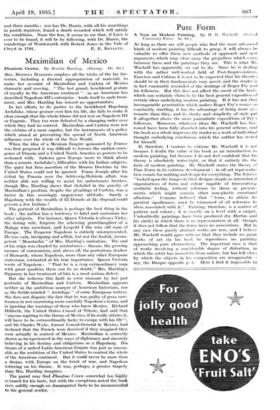Maximilian of Mexico
Phantom Grown: By Bertha Harding. (Harrap. 10s. tid.)
MRs. BERTITA HARDING employs all the tricks of the lay his- torian, including a discreet appropriation of material, to
make her account of Maximilian and Carlota of Mexico dramatic and moving. " The last grand, bewildered gesture of royalty in the American continent "—as an American has described Napoleon III's enterprise—lends itself to such treat- ment, and Mrs. Harding has missed no opportunities.
. In her efforts to do justice to the bewildered Hapsburg .Archduke, whose gesture cost him his life, she fails to make it clear enough that the whole blame did not rest on Napoleon III or Eugenie. They too were defeated by a changing order over which they had no control. Maximilian and Carlota were not the victims of a mere caprice, but the instruments of a policy which. aimed at preventing the spread of North American influence over the whole of the New World.
When the idea of a Mexican Empire sponsored by France was first proposed it was difficult to foresee the sudden emer- gence of Prussia and a United North America as powers to be reckoned with. Sadowa gave Europe more to think about than a remote Archduke's difficulties with his Indian subjects.
The quiet but firm assertion of the Monroe Doctrine by the United States could not be ignored. Franz Joseph after his defeat by Prussia over the Schleswig-Holstein affair, was neither able nor willing to assist his unfortunate brother, though Mrs. Harding shows that disbelief in the gravity of Maximilian's position, despite the pleadings of Carlota, was a factor in this seemingly ungenerous attitude. Surely a Hapsburg with the wealth of El Dorado at his disposal could govern a few Indians !
The portrait of Maximilian is perhaps the best thing in the book ; the author hai a tendency to label and caricature her other subjects. For instance, Queen Victoria is always Vicky, the doting wife, Eugenie the scheming granddaughter of a Malaga wine merchant,..arid Leopold I the wise old man of
Europe. . The Emperor Napoleon is entirely misrepresented.
lie was vain, intriguing and selfish, but not the foolish, incom- petent " Moustichu " of Mrs. Harding's caricature. The end of his reign was clouded by misfortunes :• diseaSe, the growing menace of communism, and, above all, the portentous shadow of Bismarck, whom Napoleon, more than any other European
statestnati, estimated at his true 'importance.' Vtieen Victoria wrote of Napoleon " That he is a very extraordinary man with great qualities there can be no doubt." Mis. Harding's flippancy in her treatment of him is a most serious defect.
But she redeems this fault in sonic measure by her just portraits of Maximilian and 'Carlota. Maximilian appears neither as the ambitious usurper of American historians, nor
'as the feeble-minded " Archclupe " of some European writers. She does not diiguise the fact that he was guilty of gross care-
lessness in not examining more carefully Napoleon's terms, and in ignoring the warnings of those who knew Mexico. Richard Hildreth, the United States Consul at Trieste, had said that "anyone aspiring to the throne of Mexico; if he really attains it, will have to be extraordinarily lucky to escape with his lire': and Sir Charles Wyke, former Consul-General in Mexico,-had declared that the French were deceived if they imagined they were actually -in control of -Mexico. Maximilian is correctly shown as inexperienced in the Ways of diplomacy and sincerely believing in his destiny and obligations as a' Hapsburg. His dream of a united Latin-American Empire was just as reason- able as the ambition of the. United States to control the whole of the American continent. But it coulet never be-more than a dream, with Europe on the • brink of war, and Napoleon tottering on his throne, It- was,- perhaps, a -greater tragedy than Mrs. Harding imagines. - -•
• The purist may-find Phantom -Crown somewhat too highly cc loured for his taste, but with the exceptions noted the book rests solidly enough .on documrated facts to be recommended to the general reader. ,






































 Previous page
Previous page